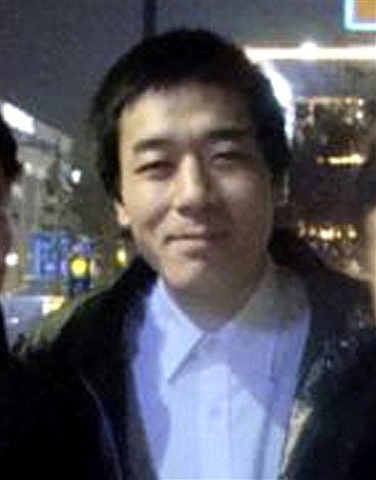By Julie Ha
A Korean American missionary who deliberately crossed into North Korea on Christmas Day with a message for dictator Kim Jong-il is neither crazy nor naïve, said a pastor who has worked closely with him the last four years.
The Reverend John Benson of the Life in Christ Community Church in Tucscon, Ariz., instead painted a picture of Robert Park as a fiercely devoted Christian who, after working with North Korean refugees in Seoul, committed himself to doing whatever it takes to alleviate the suffering of the North Korean people. And because they continue to live under a repressive regime, the 28-year-old felt a sense of urgency to his mission.
“It’s driven by love,” said Benson. “Seriously, this is the source.”
On Christmas Day, Park walked across the frozen Tumen River from China into the communist North, as other activists apparently watched and filmed him. One of those activists from a Seoul-based group called Pax Koreana told various media outlets that Park was carrying a Bible and letter for Kim, urging him to release political prisoners and allow humanitarian aid for the North’s people.
A few days after Park’s crossing, Pyongyang acknowledged his detainment and said he was being questioned. A U.S. State Department spokesman meanwhile said in late December that officials were still trying to determine the American’s whereabouts. In March of last year, two American journalists were convicted in a North Korean court after illegally entering the reclusive country while reporting a story. Euna Lee and Laura Ling were later released after former President Bill Clinton, apparently at the request of Kim, paid a visit to the North.
In this latest case, some South Korean analysts have speculated that the Pyongyang government will just deport Park in order to deflate any attention to his cause, while others have said the missionary might be punished for attacking Kim’s rule so overtly. Notably, days before entering the North, Park told loved ones and a media agency that he did not want U.S. officials to negotiate his release. If he had to die with the North Korean people, he would.
“[For] these innocent men, women and children, as Christians, we need to take the cross for them,” Park told Reuters Dec. 22. “And if [Kim Jong-il] kills me, in a sense, I realize this is better. Then the governments of the world will become more prone to say something, and more embarrassed and more forced to make a statement.”
In the past year, the U.S.-born Park, an Arizona resident before moving to South Korea in 2008, has emerged as a vocal advocate of North Korean human rights issues, according to Seoul-based activists. The activists also noted his religious devotion.
“Like everyone else, I was stunned by Robert’s action,” said Tim Peters, director of the Seoul-based Helping Hands Korea, a Christian group that assists North Korean refugees. “Given the iron-fisted, brutal nature of the North Korean regime, the decision to cross the river struck me as ill-advised, but there is also a quixotic dimension to it since there was no question of Robert’s pure motives.”
Pastor Benson characterized Park as soft-spoken personally, but “extremely bold” when it comes to serving God. That passion is sometimes misunderstood, said Benson. The two met in 2005, after Park approached the Tucson church seeking aid for his efforts to help the poor in Nogales, Mexico. The pastor said Park was once an atheist and had shared with the church congregation his personal battle with obsessive-compulsive disorder. After a chance encounter with a Nigerian minister in South Korea during his teen years, he gradually converted to Christianity and experienced a dramatic personal healing, said Benson.
Park told his fellow church members that, in the past, each day felt like a “heart attack” for him—even going to the mailbox was difficult. But following his conversion and his subsequent work helping the needy through the church, he would often smile and declare, “This is the greatest day of my life,” according to Benson.
After watching a documentary about the plight of North Korean children two years ago, Park was so moved that he decided to go to South Korea to work with North Korean refugees there, Benson said. The South Korean and U.S. governments have long contended that North Korea maintains a network of prison camps with tens of thousands of political prisoners incarcerated. And although the devastating North Korean famine of the 1990s is over, today, the people still struggle with severe food shortages, human rights activists say.
On Dec. 23, Park sent his parents, Korean immigrants who live in Encinitas, Calif., an email that hinted at his dramatic plans. “Know that I am the happiest in all my life,” he wrote. “Incredible miracles are happening in the liberation of North Koreans right now…. We are going to see a big and beautiful change in Korea and in the world this year!”
Despite Park’s stated wish to remain in North Korea, his older brother Paul, based in Los Angeles, said in a released statement that the family, working with U.S. officials, is focused on his safe return. “The last few days have been very difficult and challenging for the family, not knowing Robert’s whereabouts and/or his current state of well-being has been a source of ongoing concern and anxiety,” the statement read. “He is a very special member of our family. We miss having his love and compassion in our home.
“I don’t know where he’s being held, but if he can receive this message, we want him to know we love him, we miss him and we are waiting anxiously for the opportunity to be reunited with him.”
Although some observers have dismissed Park as foolish to think he could spur any positive changes in the North, given Kim’s totalitarian rule, the complex political situation involving the North’s nuclear weapons program and the United States’ presence on the peninsula, Benson said Park understood the consequences. He said Park closely studied the North Korean issue and even learned to speak Korean fluently in order to “be effective” in his mission.
“[Robert] told me, ‘I’m not trying to be a martyr,” said Benson, recalling a phone conversation with Park in November. “‘But something has to happen. I can’t keep listening to these refugees talk about these atrocities, about their family members being put into camps.’ This guy has so much love. He doesn’t just cry. He cries and then he says, ‘I have to do something.’”
Peters also praised Park’s passion and self-sacrifice, but advised that others who share the desire to aid North Koreans should take more practical steps, such as assisting refugee shelters and escape networks. “Helping North Koreans inside their country, which is essentially a huge prison with Kim Jong-il as its warden, is terribly difficult,” he said.
The activist, however, believes Park’s actions could yield some positive outcome. “Given the deplorable state of apathy that exists in South Korea and the Korean American community regarding the suffering of North Korean people and the utter vacuum of any human rights in the North, even such a radical action as Robert’s is bound to stir the sleeping consciences of some and perhaps spur some to meaningful action.”








